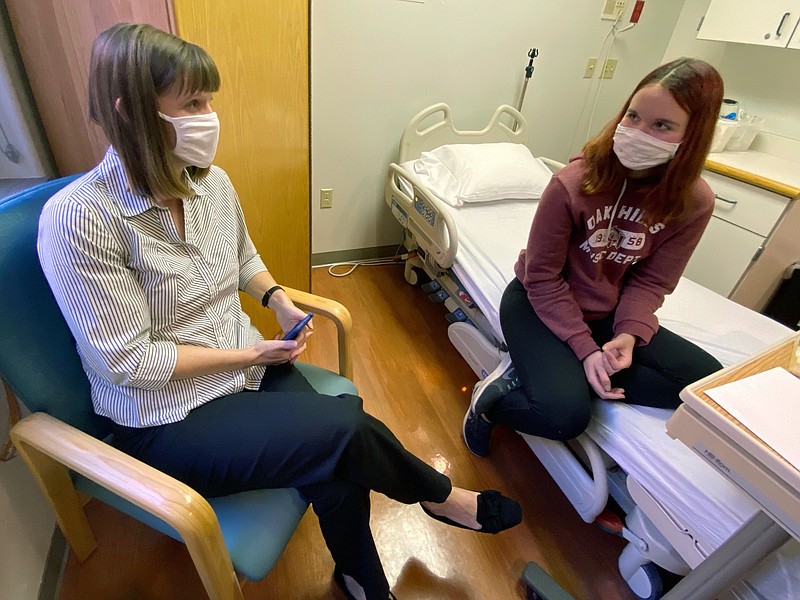Declared presidential winner Joe Biden and his vice-presidential pick, U.S. Sen. Kamala Harris, have a serious dilemma on their hands.
With the news Monday from Pfizer that a coronavirus vaccine it developed has been shown to be up to 90% effective, the two Democrats who discounted any news from the White House about a potential cure will either need to reverse their previous positions or be labeled uninterested in seeing Americans get out from under the deadly pandemic.
President Donald Trump had said for months that an effective vaccine was likely to be developed by the end of the year, with the help of Operation Warp Speed that he put in motion, but Biden and Harris repeatedly suggested anything Trump said about a vaccine couldn't be trusted.
"In terms of the whole notion of a vaccine," Biden said during the first presidential debate, "we're for a vaccine, but I don't trust him at all. Nor do you. I know you don't. What we trust is a scientist."
"If the public health professionals, if Dr. [Anthony] Fauci, if the doctors tell us that we should take it, I'll be the first in line to take it, absolutely," Harris said during the vice presidential debate. "But if Donald Trump tells us that we should take it, I'm not taking it."
Their answers sounded like phrases exchanged during a fourth-grade playground argument. Nevertheless, they persisted.
Asked during the second presidential debate what steps he would "take to give Americans confidence in a vaccine if it were approved," Biden repeated that a vaccine approved by the White House couldn't be trusted, and that "there's no prospect that there's going to be a vaccine available for the majority of the American people before the middle of next year."
Today, the country - like the world, going through a spike in cases as winter approaches - stands on the threshold of such a vaccine. As it stands, Pfizer would be on track to petition the federal government for authorization of the vaccine by the end of this month.
The development of a vaccine has been the task of a number of global laboratories over the past six or eight months, while the Trump administration has made plans to make the vaccines free for Americans and to distribute them.
Nowhere have any scientists or epidemiologists working on a vaccine suggested the administration has taken any improper steps to rush them or asked them to alter anything they would do to develop the safest, most effective vaccine available. Indeed, they have emphasized how science has led the way.
Fauci, the government's top infectious disease expert that Harris said she'd listen to, echoed the praise Trump had for the news Monday, calling the 90% effectiveness rate in trials "just extraordinary."
Yet, the rhetoric from the Democrats has had a deleterious effect. National polls - for whatever they're worth after botching another election so badly - indicate skepticism from many Americans about taking a vaccine.
Locally, a survey of voters by Times Free Press editors and reporters indicated that 61.8% of respondents didn't trust the information coming from the White House about the coronavirus. Interestingly, exactly 61.8% of respondents in a separate question said they did trust the information about the coronavirus coming from the Centers for Disease Control and Prevention.
In the same survey, only 46.4% of respondents said they would take a vaccine when it becomes available. Exactly a third, 33%, said they would not, with 17.2% indicating they were undecided.
New York Democratic Gov. Andrew Cuomo, whose actions during the early months of the virus are said to have led to an enormous rise in deaths in nursing homes in that state, took the Biden-Harris line Monday after hearing the good news.
"The bad news is that it's about two months before Joe Biden takes over," he said, "and that means this administration is going to be implementing a vaccine plan."
Cuomo, without providing any evidence, said he believes the administration plan is "flawed" and will "leave out all sorts of communities that were left out the first time when COVID ravaged them."
However, Health and Human Services Secretary Alex Azar said Tuesday the administration's plan will do exactly what the New York governor said it wouldn't.
He said Pfizer plans to distribute some 20 million doses, pending emergency use authorization, each month beginning at the end of November.
"We have anticipated that we will have enough vaccine by the end of December to have vaccinated our most vulnerable citizens in nursing homes and otherwise," Azar said on NBC's "Today" show, "and by the end of January enough for all health care workers and first responders and enough for all Americans by the end of March to early April to have general vaccination programs."
Biden, on Monday, while cheering the news, didn't praise the Trump administration for Operation Warp Speed but didn't repeat his words about a vaccine the White House had any dealings with as being untrustworthy.
However, if Americans can't trust the man who expects to become president to be right about something so crucial, what will they be able to trust him with?
